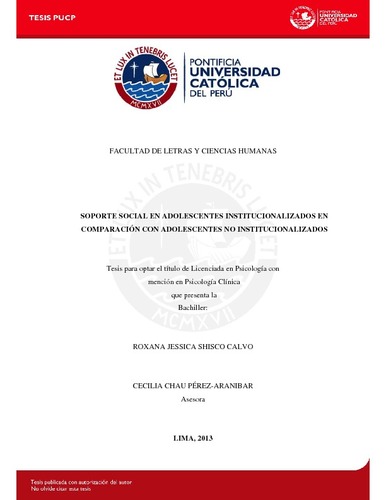| dc.contributor.advisor | Chau Pérez-Aranibar, Cecilia Beatriz | es_ES |
| dc.contributor.author | Shisco Calvo, Roxana Jessica | es_ES |
| dc.date.accessioned | 2014-02-07T16:30:37Z | es_ES |
| dc.date.available | 2014-02-07T16:30:37Z | es_ES |
| dc.date.created | 2013 | es_ES |
| dc.date.issued | 2014-02-07 | es_ES |
| dc.identifier.uri | http://hdl.handle.net/20.500.12404/5087 | |
| dc.description.abstract | El soporte social amortigua los eventos estresantes a los que se ve sometido el
adolescente institucionalizado (residente en un Centro de Atención Residencial) como la
separación de la familia, la adaptación a la vida de la institución, entre otros. Por esta razón,
la presente investigación tiene como objetivo comparar los tipos de soporte social
emocional, instrumental y de acompañamiento social, en términos del soporte recibido y el
grado de satisfacción con el mismo, entre adolescentes institucionalizados y no
institucionalizados. La muestra estuvo conformada por 29 adolescentes institucionalizados
y 31 adolescentes no institucionalizados, de ambos sexos, cuyas edades oscilan entre 15 y
17 años. Para ello, se utilizó los Cuestionarios de Transacciones de Soporte Social (CTSS;
Suurmeijer et al., 1995) y Satisfacción de Soporte Social (CSSS; Doeglas et al., 1996).
Como resultado, no se encontraron diferencias significativas en los tipos de soporte social
entre los adolescentes institucionalizados y no institucionalizados. No obstante, en el grupo
de adolescentes institucionalizados, se encontraron diferencias significativas en los tipos de
soporte social según edad, composición familiar, posición entre hermanos, motivo de
ingreso a la institución y tener familiares viviendo en la institución. Además, en el grupo de
adolescentes institucionalizados, se encontró una relación entre los tipos de soporte social y
el apoyo recibido de los contextos extra familiares como la institución y el colegio.
Palabras clave: Adolescente, Institucionalización, Soporte social | es_ES |
| dc.description.abstract | ABSTRACT
Social support in institutionalized adolescents in comparison with noninstitutionalized
adolescents
Social support dampens the stressful events to which the institutionalized adolescent
is subjected to (who is residing in a residential care center), such as the separation from
his/her family, adaptation to the life of the institution, among others. For this reason, the
objective of this investigation is to compare the types of emotional, social, instrumental and
companionship support, in terms of the support received and the degree of satisfaction with
such support, between institutionalized and non-institutionalized adolescents. The sample
was conformed by 29 institutionalized adolescents and 31 non-institutionalized adolescents
of both sexes, with ages ranging between 15 and 17 years. The instruments used in the
investigation were Social Support Questionnaire for Transactions (SSQT; Suurmeijer et al.,
1995) and Social Support Questionnaire for Satisfaction with the Supportive Transaction
(SSQS, Doeglas et al., 1996).
Keywords: Adolescent, Institutionalization, Social Support
The result of this study showed that there were no significant
differences in the types of social support between institutionalized and non-institutionalized
adolescents. However, in the group of institutionalized adolescents, there were significant
differences in the types of social support according to age, family composition, sibling
position, reason for admission to the institution and having relatives living in the institution.
In addition, in the group of institutionalized adolescents, a relationship between the types of
social support and the support received from extrafamilial contexts, such as the institution
and school, was found | es_ES |
| dc.language.iso | spa | es_ES |
| dc.publisher | Pontificia Universidad Católica del Perú | es_ES |
| dc.rights | Atribución-NoComercial-SinDerivadas 2.5 Perú | * |
| dc.rights | info:eu-repo/semantics/openAccess | es_ES |
| dc.rights.uri | http://creativecommons.org/licenses/by-nc-nd/2.5/pe/ | * |
| dc.subject | Adolescentes | es_ES |
| dc.subject | Soporte social | es_ES |
| dc.subject | Psicología del adolescente | es_ES |
| dc.title | Soporte social en adolescentes institucionalizados en comparación con adolescentes no institucionalizados | es_ES |
| dc.type | info:eu-repo/semantics/bachelorThesis | es_ES |
| thesis.degree.name | Licenciado en Psicología Clínica | es_ES |
| thesis.degree.level | Título Profesional | es_ES |
| thesis.degree.grantor | Pontificia Universidad Católica del Perú. Facultad de Letras y Ciencias Humanas | es_ES |
| thesis.degree.discipline | Psicología Clínica | es_ES |
| renati.discipline | 313026 | es_ES |
| renati.level | https://purl.org/pe-repo/renati/level#tituloProfesional | es_ES |
| renati.type | http://purl.org/pe-repo/renati/type#tesis | es_ES |
| dc.publisher.country | PE | es_ES |
| dc.subject.ocde | https://purl.org/pe-repo/ocde/ford#5.01.00 | es_ES |






